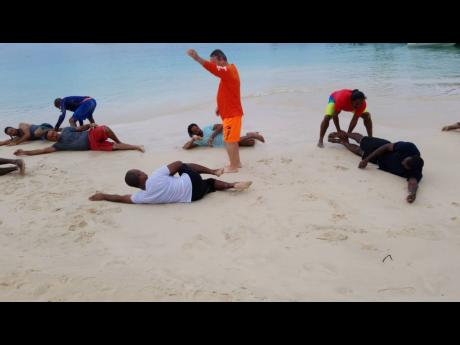Earth Today | Caribbean fisherfolk take practical actions to sustain livelihood
FISHERFOLK IN Anguilla and Montserrat have successfully implemented practical action projects on climate change adaptation and ecosystem stewardship, and helped build the resilience of fisheries and marine resources and their livelihoods.
These practical action projects were supported by small grants and mentoring from the Caribbean Natural Resources Institute (CANARI) under the three-year project, ?Climate change adaptation in the fisheries of Anguilla and Montserrat?, from 2017 to 2020.
The project aimed to mainstream climate change adaptation into fisheries governance and management in Anguilla and Montserrat, using an ecosystem approach to fisheries.
It was funded by the United Kingdom Government?s Darwin Initiative. Under the project, CANARI established a US$24,000 small grant facility as part of its Caribbean Sea Innovation Fund (CarSIF).
AIM OF PROJECT
The objective was to support capacity building of fisherfolk and their organisations for local adaptation to climate change and ecosystem stewardship in Anguilla and Montserrat.
From August 2019 to February 2020, fisherfolk organisations in both islands implemented six-month-long projects, with small grants valued at approximately US$10,000-11,000.
In Anguilla, for example, the Anguilla Fisherfolk Association (AFFA) collaborated with the Anguilla Fishing Cooperative (AFC), Anguilla National Trust, Department of Disaster Management and Department of Fisheries and Marine Resources to implement their small grant project, 'Increasing safety at sea and stewardship among Anguillan fisherfolk to build climate change resilience'.
SAFETY AT SEA
The project sought first to address safety at sea concerns in Anguilla due to more extreme weather, including rough seas and more intense hurricanes and storms because of climate change. This has led to increased difficulties with navigation by fishers and damage to boats at sea, resulting in increased incidents of fisherfolk.
To address these issues, AFFA and AFC focused on increasing awareness on priorities and best practices for safety at sea.
They also built capacity for safety at sea response among Anguillan fisherfolk through practical training workshops in First-Aid, Cardiopulmonary Resuscitation (CPR) and Water Safety facilitated with the Anguilla Red Cross and purchased safety equipment. Fifteen Anguillan fishers were certified in First-Aid, CPR and Water Safety.
HABITAT REHABILITATION
Second, AFFA and AFC worked with the Anguilla National Trust to construct 102 lobster traps and collect blue stone to support habitat rehabilitation for the Caribbean spiny lobster and create an artificial reef in the Prickly Pear Marine Park. Fishers helped to deploy 22 of the traps in the Marine Park under the project.
These efforts helped to foster stewardship in protecting and restoring critical marine habitats, such as coral reefs and mangroves, that are threatened by pollution, coastal development and climate change impacts, such as coral bleaching and ocean acidification.
Addressing impacts on these marine habitats, which are important fishing grounds and nurseries, can affect fish abundance and distribution in nearshore areas and reduce need for fishers to venture farther out to sea to catch fish.
In Montserrat, the Montserrat Fishing and Boaters Association Inc (MFBA) collaborated with the Montserrat Fisherman?s Co-operative (MFC) to implement their small grant project, 'Building resilience to climate change in Montserrat?s fisheries though climate-smart practices and stewardship in Montserrat'.
Among other things, there is an increasing need for fishers to venture out further to fish and use fish aggregating devices (FADs). Climate change impacts, such as more intense storms, rough seas and ocean acidification, compound these threats to fisheries and marine habitats and related livelihoods.
To address these issues, the MFBA and MFC focused first on making their gear such as FADs and fish traps more climate smart and environmentally friendly. They refurbished a FAD, installing a solar-powered buoy with GPS that monitors ocean currents and temperature, and using more robust materials so that the FAD can withstand rough seas. They also installed escape doors in 22 fish traps belonging to 12 fishers to help address 'ghost fishing', where lost traps continue to fish leading to the mortality of any fish trapped in the gear.
In addition to the excellent results achieved under the small grant projects, the fisherfolk organisations in both islands have grown in their capacity in project management and reporting.
They have also strengthened their ability to collectively undertake practical actions with fisherfolk and supporting agencies to make local livelihoods more sustainable and resilient.


